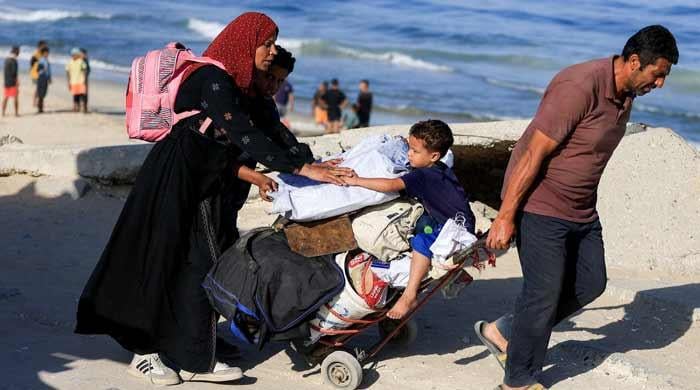
Arab American Trump Supporters Welcome Gaza Truce with Caution
In the wake of a fragile ceasefire between Israel and Hamas, Arab American supporters of former President Donald Trump are expressing a mix of optimism and skepticism about the developments in Gaza. The recent truce, which came into effect on October 11, 2025, has allowed many displaced Palestinians to return to their homes in northern Gaza after being ordered to evacuate to the southern part during the intense fighting. However, the complexities of the situation make it essential for supporters from the Arab American community to navigate their feelings carefully.
Understanding the Context
The conflict between Israel and Hamas has been a long-standing and multifaceted issue that has evoked strong emotions and responses from various communities around the world. For Arab Americans, particularly those who have supported Trump, the dynamics are complicated. Historically, Trump's administration took a pro-Israel stance, which has led to a unique position for Arab Americans who align with his political views.
The recent ceasefire was brokered amid escalating violence that resulted in significant loss of life and displacement. As the dust settles, many in the Arab American community are grappling with the implications of this truce not only for Palestinians in Gaza but also for their own identities and political beliefs.
Mixed Reactions Among Arab American Trump Supporters
Following the announcement of the ceasefire, Arab American Trump supporters expressed cautious optimism. Many see the truce as an opportunity for peace and a chance to rebuild lives in Gaza. However, there remains a palpable sense of skepticism regarding the durability of this agreement and the potential for renewed conflict.
1. Hope for Humanitarian Relief: The ceasefire has been viewed as a potential lifeline for those suffering in Gaza. Supporters are hopeful that humanitarian aid will flow into the region, addressing urgent needs for food, shelter, and medical care.
2. Skepticism about Long-Term Solutions: Despite the temporary relief, many Arab American Trump supporters are concerned about the long-term implications of the ceasefire. They worry about the lack of a comprehensive peace plan and the ongoing tensions between Israelis and Palestinians.
3. Political Implications: The nuances of political alignment are significant for Arab Americans who support Trump. While they may appreciate some aspects of his policies, they also feel the weight of their cultural identity, which is often at odds with the broader political narrative in the United States.
The Role of Media in Shaping Perceptions
Media portrayal of the Israel-Palestine conflict can significantly influence public perception and sentiment. Arab American Trump supporters often find themselves navigating a complex landscape where their voices may be underrepresented or misrepresented.
Many within this community emphasize the importance of accurate reporting that reflects the diverse perspectives of Arab Americans. They advocate for a balanced approach that considers the historical context and current realities faced by both Palestinians and Israelis.
Community Initiatives and Responses
In light of the ceasefire, various Arab American organizations are mobilizing to provide support for humanitarian efforts in Gaza. These initiatives include fundraising campaigns, advocacy for policy changes, and collaboration with other community groups to amplify their voices.
Engagement in these activities reflects a desire not only to support those affected by the conflict but also to foster understanding and dialogue within the broader American landscape. Arab American Trump supporters are keen on showing that their political alignments do not overshadow their commitment to humanitarian values.
The Path Forward
As the situation in Gaza continues to evolve, Arab American Trump supporters remain vigilant. They understand that the ceasefire is just the beginning of a long journey toward healing and reconciliation. They are committed to advocating for solutions that promote peace, justice, and coexistence.
Key considerations for the community moving forward include:
- Continued Advocacy: Engaging in advocacy efforts that promote a balanced understanding of the conflict and support for humanitarian needs.
- Building Bridges: Finding common ground with other communities to foster dialogue and understanding around shared values and concerns.
- Monitoring Developments: Staying informed about the situation in Gaza and the broader Israeli-Palestinian conflict to effectively respond to changes.
Conclusion
The recent ceasefire between Israel and Hamas offers a moment of hope for many, including Arab American Trump supporters. However, the complexities of the situation call for a cautious approach. As this community navigates its identity and political beliefs, it remains committed to advocating for peace and humanitarian support for those affected by the ongoing conflict.
---
FAQs
Q: What is the current situation in Gaza following the ceasefire?
A: As of October 11, 2025, a ceasefire has been established, allowing many displaced Palestinians to return to their homes. Humanitarian efforts are underway to provide essential aid to those affected by the conflict.
Q: How do Arab American Trump supporters feel about the ceasefire?
A: They express a mix of cautious optimism and skepticism, hoping for humanitarian relief while questioning the long-term stability of the peace agreement.
Q: What initiatives are Arab American organizations undertaking?
A: Various organizations are mobilizing to provide humanitarian support to Gaza, engage in advocacy for policy change, and promote dialogue within the broader community.
Q: Why is media portrayal important in the context of this conflict?
A: Media representation can shape public perception significantly. Arab American supporters emphasize the need for balanced coverage that accurately reflects diverse perspectives in the region.
Q: What steps can be taken to promote peace in the region?
A: Continued advocacy, building bridges with other communities, and staying informed about developments are critical steps toward fostering peace and understanding in the Israeli-Palestinian conflict.
Tags
World
